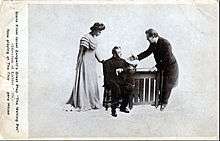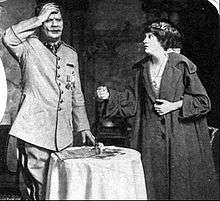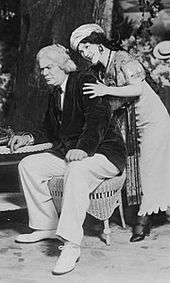Henry Vogel
| Henry Vogel | |
|---|---|
|
Henry Vogel publicity shot from the play Princess Tra-La-La, 1916 | |
| Born |
June 15, 1863 Mindszent, Hungary |
| Died |
June 17, 1925 (aged 62) New York, NY, US |
| Occupation | Stage Actor |
| Years active | 1888–1920 |
Henry Vogel (June 15, 1863 – June 17, 1925) was an American actor and bass-baritone singer who originated several roles on the Broadway stage during the first two decades of the Twentieth Century.
Early life
Henry Vogel was born Heinrich Vogelhut in Mindszent, Hungary.[1] Ignoring his parents' wishes that he enter the clergy, he left Hungary for America in 1882.[2]
Career
After his arrival in America, he obtained US citizenship and attended the Balatka Academy of Musical Art, founded by Hans Balatka in Chicago during the late 1880s. There (as Henry Vogelhuth), he performed in several of its productions[3][4][5] before moving to New York City.[6] In 1890 (as Henry Vogel) he appeared in an English-language version of Jacques Offenbach's The Brigands starring Lillian Russell,[7] and in 1903, he landed a role in the Broadway production of Nancy Brown.[8][9] Other productions followed, including Paris by Night (1904),[10] Miss Dolly Dollars (1905),[11] and Victor Herbert’s The Wizard of the Nile (1908).[12]

It was announced in the press in 1907 that Byron Ongley (co-author of Brewster’s Millions)[13] had written a vaudeville skit for him, Vogel, the Boy Detective, and His Shadow, Nearly – the shadow to be played by a midget.[14][15]
Back on the Broadway stage in 1909, he played Herr Pappelmeister to Walker Whiteside’s David Quixano in the original 1909 production of Israel Zangwill’s play, The Melting Pot.[16] His turn as Pappelmeister received acclaim, and the production itself was favorably reviewed by then US president Theodore Roosevelt.[17]

Vogel went on to prominent roles in several other Broadway plays and operettas, including The Firefly (1912),[18] Marie-Odile (1915),[19] and Arms and the Girl (1916).[20] Health issues caused him to move to California to pursue work in films, but continued ill health forced his retirement and return to New York around 1920.[21]
Family
Henry Vogel was the son of David Vogelhut and Eleanora "Leni" Vogelhut (née Propper)[1] and was Jewish.[22]
Death
Henry Vogel died in New York City two days after his 62nd birthday, following a heart attack.[21][23]

Selected plays
- Nancy Brown (1903), Henry Vogel as Baron Sauerbraten[24]
- Miss Dolly Dollars (1905) as Lieutenant von Richter[24]
- The Wizard of the Nile (1908) as King Ptolemy[12][25]
- Dolly Varden (Previous to May 1908, Bijou, New Brunswick, N.J)[26]
- The Melting Pot (1909) as Herr Pappelmeister[24]
- The Little Damozel (1910)[24]
- Paris By Night as Orlof Sleuthski (1904–05)[24]
- The Girl and the Governor (Circa 1907/08)[26]
- The Firefly (1912) as Herr Franz[24]
- Marie-Odile as Sergeant Otto Beck (1915)[19]
- Arms and the Girl (originally titled A Delicate Situation)(1916) as General Klaus[24]
- Princess Tra-La-La (1916)[2]
- Some Daddy (1918)[27]
External links
References
- 1 2 Birth register of the town of Hunfalu, p. 158b, record number 4
- 1 2 The Pittsburgh Press, March 5, 1916, Theatrical Section, p. 2
- ↑ Chicago Tribune, June 8, 1888, p. 5, as part of a column titled, The Theatres; referred to as Henry Vogelhuth.
- ↑ Chicago Daily Tribune, June 8, 1888, pp. 5 and 8
- ↑ The Inter Ocean, March 23, 1888, p. 4
- ↑ Variety, "Correspondence," May 4, 1917, p 34
- ↑ McVicker’s Theatre program, November 4, 1889 image from Chicago Public Library
- ↑ Internet Broadway Database Nancy at Brown IBDB
- ↑ Detroit Free Press, 1/17/1904, p. C7
- ↑ The Billboard, July 16, 1904, p. 5
- ↑ A Theatrical Life: Victor Herbert, by Neil Gould, 2008
- 1 2 The Washington Post, May 5, 1908, p. 5
- ↑ "Byron Ongley". Internet Broadway Database. Retrieved 2016-01-11.
- ↑ Variety, August 1907
- ↑ New York Dramatic Mirror, August 24, 1907
- ↑ Internet Broadway Database The Melting Pot at IBDB
- ↑ Joe Kraus. "How the Melting Pot Stirred America: The Reception of Zangwill's Play and Theater's Role in the American Assimilation Experience", MELUS, Vol. 24, No. 3, Varieties of Ethnic Criticism (Autumn, 1999), pp. 3–19
- ↑ Internet Broadway Database The Firefly at IBDB
- 1 2 The Brooklyn Daily Eagle, January 27, 1915, p. 9
- ↑ Arms and the Girl at the Internet Broadway Database
- 1 2 Variety, June 24, 1925, p. 89
- ↑ The Jewish Chronicle, November 27, 1908
- ↑ Broadway World Henry Vogel entry at Broadway World
- 1 2 3 4 5 6 7 Internet Broadway Database, Henry Vogel
- ↑ The Baltimore Sun, April 28, 1908, p 9
- 1 2 The Washington Times, May 10, 1908, p. 2
- ↑ The New York Clipper, January 16, 1918 Image from University of Illinois digital library
